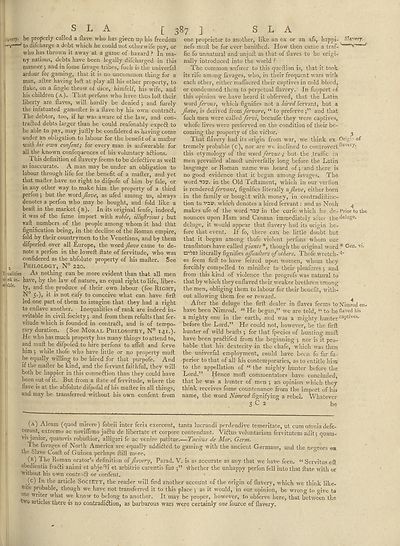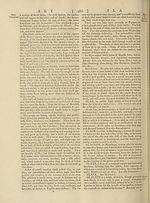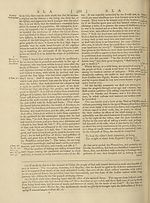Encyclopaedia Britannica, or, a Dictionary of arts, sciences, and miscellaneous literature : enlarged and improved. Illustrated with nearly six hundred engravings > Volume 19, Scripture-SUG
(431) Page 387
Download files
Complete book:
Individual page:
Thumbnail gallery: Grid view | List view

SLA
[avery. be properly called a Have who has given up his freedom
-Y—J to difcharge a debt which he could not otherwife pay, or
who has thrown it away at a game of hazard > In" ma¬
ny nations, debts have been legally difcharged in this
manner ; and in fome favage tribes, fucli is the univerfal
ardour for gaming, that it is no uncommon thing for a
man, after having loft at play all his other property, to
flake, on a fingle throw of dice, himfelf, his wife, and
his children (a). That perfons who have thus loft their
liberty are flaves, will hardly be denied j and furely
the infatuated gamefter is a Have by his own contradl.
The debtor, too, if he was aware of the law, and con¬
tracted debts larger than he could reafonably expedl to
be able to pav, may juftly be confidered as having come
under an obligation to labour for the benefit of a mafter
wit/i his own confent; for every man is anfvverable for
all the known confequences of his voluntary adtions.
This definition of ilavery feems to be defedtive as well
as inaccurate. A man may be under an obligation to
labour through life for the benefit of a mafter, and yet
that mafter have no right to difpofe of him by fale, or
in any other way to make him the property of a third
perfon; but the word Jlave, as ufed among us, always
denotes a perfon who may be bought, and fold like a
beaft in the market (b). In its original fenfe, indeed,
it was of the fame import with noble, illujlrious ; but
vaft numbers of the people among whom it had that
fignification being, in the decline ot the Roman empire,
fold by their countrymen to the Venetians, and by them
difperfed over all Europe, the word Jlave came to de¬
note a perfon in the lovveft ftate of fervitude, who was
confidered as the abfolute property of his mafter. See
2 Philology, N° 220.
I ualities As nothing can be more evident than that all men
0Ink in- have, by the law of nature, an equal right to life, liber-
^ lble> ty, and the produce of their own labour (fee Right,
50> ^ is n°t eafy to conceive what can have firft
led one part of them to imagine that they had a right
to enflave another. Inequalities of rank are indeed in¬
evitable in civil fociety j and from them refults that fer¬
vitude which is founded in contradft, and is of tempo¬
rary duration. (See Moral Philosophy, N° 141.).
He who has much property has many things to attend to,
and muft be difpoled to hire perfons to aflift and ferve
him j while thofe who have little or no property muft
be equally willing to be hired for that purpofe. And
if the mafter be kind, and the fervant faithful, they will
both be happier in this connexion than they could have
been out of it. But from a ftate of fervitude, where the
Have is at the abfolute difpofal of his mafter in all things,
end may be transferred without his own confent from
87 ] 1 SLA
one proprietor to another, like an ox or an afs, happi- Slavery,
nefs muft be for ever baniftied. How then came a traf- ' v"
fic fo unnatural and unjuft as that of llaves to be origi¬
nally introduced into the world ?
The common anfwer to this queftion is, that it took
its rife among favages, who, in their frequent wars with
each other, either maffacred their captives in cold blood,
or condemned them to perpetual Ilavery. In fupport of
this opinion we have heard it obferved, that the Latin
word fervus, which fignifies not a hired fervant, but a
Jlave, is derived from fervare, “ to preferve 5” and that
fuch men were called fervi, becaufe they were captives,
whofe lives were preferved on the condition of their be¬
coming the property of the vidfor. 3
That flavery had its origin from war, we think ex Orig-' - of
tremely probable (c), nor are we inclined to controvert
this etymology of the word fervus ; but the traffic in
men prevailed almoft univerfally long before the Latin
language or Roman name was heard of; and there is
no good evidence that it began among favages. The
word "TDj;, in the Old Teftament, which in our verlion
is rendered fervant, fignifies literally a fave, either born
in the family or bought writh money, in contradiitinc-
tion to vatv, which denotes a hired fervant: and as Noah 4
makes ufe of the word in the curfe which he de- Prior to the
nounces upon Ham and Canaan immediately after the deluge,
deluge, it would appear that llavcry had its origin be¬
fore that event. If fo, there can be little doubt but
that it began among thofe violent perfons whom our
tranflators have called*, though the original word* Gen. vi»
D'bss literally fignifies ajfaulters of others. Thofe wretch- 4'
es feem firft to have feized upon women, whom they
forcibly compelled to minifter to their pleafures •, and
from this kind of violence the progrefs was natural to
that by which they enflaved their weaker brethren among
the men, obliging them to labour for their benefit, with¬
out allowing them fee or reward. ^
After the deluge the firft dealer in flaves feems to Nimrod en-
have been Nimrod. u He began,” we are told, “ to behaved his
a mighty one in the earth, and was a mighty hunter cal)tives'
before the Lord.” He could not, however, be the firft
hunter of wild beafts ; for that fpecies of hunting muft
have been praftifed from the beginning 5 nor is it pro¬
bable that his dexterity in the chafe, which was then
the univerfal employment, could have been fo far fu-
perior to that of all his contemporaries, as to entitle him
to the appellation of “ the mighty hunter before the
Lord.” Hence moft commentators have concluded,
that he was a hunter of men ; an opinion which they
think receives fome countenance from the import of his
name, the word Nimrod fignifying a rebel. Whatever
3 C 2 be
(a) Aleam (quod mirere) fobrii inter feria exercent, tanta lucrandi perdendive temeritate, ut cum omnia defe-
cerunt, extreme ac noviflimo jaftu de libertate et corpore contendant. Viftus voluntariam fervitutem adit; quam-
vis junior, quamvis robuftior, alligari fe ac venire patitur.—Tacitus de Mor. Germ.
Ihe favages of North America are equally addifted to gaming with the ancient Germans, and the neo-roes on
the Slave Coaft of Guinea perhaps ftill more.
(b) I he Roman orator’s definition ol f avert/. Farad. V. is as accurate as any that we haVe feen. “ Servitus eft
obedientia fradti animi et abje fti et arbitrio carentis fuo ;” whether the unhappy perfon fell into that ftate with or
Without his own contr a 61 or confent.
(c) In the article Society, the reader will find another account of the origin of flavery, which we think like-
v.ife probable, though we have not transferred it to this place; as it would, in our opinion, be wrong to give ta
one writer what we know to belong to another. It may be proper, however, to obferve here, that between the
two articles there -is no contradiftion, as barbarous wars were certainly one fource of flavery.
[avery. be properly called a Have who has given up his freedom
-Y—J to difcharge a debt which he could not otherwife pay, or
who has thrown it away at a game of hazard > In" ma¬
ny nations, debts have been legally difcharged in this
manner ; and in fome favage tribes, fucli is the univerfal
ardour for gaming, that it is no uncommon thing for a
man, after having loft at play all his other property, to
flake, on a fingle throw of dice, himfelf, his wife, and
his children (a). That perfons who have thus loft their
liberty are flaves, will hardly be denied j and furely
the infatuated gamefter is a Have by his own contradl.
The debtor, too, if he was aware of the law, and con¬
tracted debts larger than he could reafonably expedl to
be able to pav, may juftly be confidered as having come
under an obligation to labour for the benefit of a mafter
wit/i his own confent; for every man is anfvverable for
all the known confequences of his voluntary adtions.
This definition of ilavery feems to be defedtive as well
as inaccurate. A man may be under an obligation to
labour through life for the benefit of a mafter, and yet
that mafter have no right to difpofe of him by fale, or
in any other way to make him the property of a third
perfon; but the word Jlave, as ufed among us, always
denotes a perfon who may be bought, and fold like a
beaft in the market (b). In its original fenfe, indeed,
it was of the fame import with noble, illujlrious ; but
vaft numbers of the people among whom it had that
fignification being, in the decline ot the Roman empire,
fold by their countrymen to the Venetians, and by them
difperfed over all Europe, the word Jlave came to de¬
note a perfon in the lovveft ftate of fervitude, who was
confidered as the abfolute property of his mafter. See
2 Philology, N° 220.
I ualities As nothing can be more evident than that all men
0Ink in- have, by the law of nature, an equal right to life, liber-
^ lble> ty, and the produce of their own labour (fee Right,
50> ^ is n°t eafy to conceive what can have firft
led one part of them to imagine that they had a right
to enflave another. Inequalities of rank are indeed in¬
evitable in civil fociety j and from them refults that fer¬
vitude which is founded in contradft, and is of tempo¬
rary duration. (See Moral Philosophy, N° 141.).
He who has much property has many things to attend to,
and muft be difpoled to hire perfons to aflift and ferve
him j while thofe who have little or no property muft
be equally willing to be hired for that purpofe. And
if the mafter be kind, and the fervant faithful, they will
both be happier in this connexion than they could have
been out of it. But from a ftate of fervitude, where the
Have is at the abfolute difpofal of his mafter in all things,
end may be transferred without his own confent from
87 ] 1 SLA
one proprietor to another, like an ox or an afs, happi- Slavery,
nefs muft be for ever baniftied. How then came a traf- ' v"
fic fo unnatural and unjuft as that of llaves to be origi¬
nally introduced into the world ?
The common anfwer to this queftion is, that it took
its rife among favages, who, in their frequent wars with
each other, either maffacred their captives in cold blood,
or condemned them to perpetual Ilavery. In fupport of
this opinion we have heard it obferved, that the Latin
word fervus, which fignifies not a hired fervant, but a
Jlave, is derived from fervare, “ to preferve 5” and that
fuch men were called fervi, becaufe they were captives,
whofe lives were preferved on the condition of their be¬
coming the property of the vidfor. 3
That flavery had its origin from war, we think ex Orig-' - of
tremely probable (c), nor are we inclined to controvert
this etymology of the word fervus ; but the traffic in
men prevailed almoft univerfally long before the Latin
language or Roman name was heard of; and there is
no good evidence that it began among favages. The
word "TDj;, in the Old Teftament, which in our verlion
is rendered fervant, fignifies literally a fave, either born
in the family or bought writh money, in contradiitinc-
tion to vatv, which denotes a hired fervant: and as Noah 4
makes ufe of the word in the curfe which he de- Prior to the
nounces upon Ham and Canaan immediately after the deluge,
deluge, it would appear that llavcry had its origin be¬
fore that event. If fo, there can be little doubt but
that it began among thofe violent perfons whom our
tranflators have called*, though the original word* Gen. vi»
D'bss literally fignifies ajfaulters of others. Thofe wretch- 4'
es feem firft to have feized upon women, whom they
forcibly compelled to minifter to their pleafures •, and
from this kind of violence the progrefs was natural to
that by which they enflaved their weaker brethren among
the men, obliging them to labour for their benefit, with¬
out allowing them fee or reward. ^
After the deluge the firft dealer in flaves feems to Nimrod en-
have been Nimrod. u He began,” we are told, “ to behaved his
a mighty one in the earth, and was a mighty hunter cal)tives'
before the Lord.” He could not, however, be the firft
hunter of wild beafts ; for that fpecies of hunting muft
have been praftifed from the beginning 5 nor is it pro¬
bable that his dexterity in the chafe, which was then
the univerfal employment, could have been fo far fu-
perior to that of all his contemporaries, as to entitle him
to the appellation of “ the mighty hunter before the
Lord.” Hence moft commentators have concluded,
that he was a hunter of men ; an opinion which they
think receives fome countenance from the import of his
name, the word Nimrod fignifying a rebel. Whatever
3 C 2 be
(a) Aleam (quod mirere) fobrii inter feria exercent, tanta lucrandi perdendive temeritate, ut cum omnia defe-
cerunt, extreme ac noviflimo jaftu de libertate et corpore contendant. Viftus voluntariam fervitutem adit; quam-
vis junior, quamvis robuftior, alligari fe ac venire patitur.—Tacitus de Mor. Germ.
Ihe favages of North America are equally addifted to gaming with the ancient Germans, and the neo-roes on
the Slave Coaft of Guinea perhaps ftill more.
(b) I he Roman orator’s definition ol f avert/. Farad. V. is as accurate as any that we haVe feen. “ Servitus eft
obedientia fradti animi et abje fti et arbitrio carentis fuo ;” whether the unhappy perfon fell into that ftate with or
Without his own contr a 61 or confent.
(c) In the article Society, the reader will find another account of the origin of flavery, which we think like-
v.ife probable, though we have not transferred it to this place; as it would, in our opinion, be wrong to give ta
one writer what we know to belong to another. It may be proper, however, to obferve here, that between the
two articles there -is no contradiftion, as barbarous wars were certainly one fource of flavery.
Set display mode to:
![]() Universal Viewer |
Universal Viewer | ![]() Mirador |
Large image | Transcription
Mirador |
Large image | Transcription
Images and transcriptions on this page, including medium image downloads, may be used under the Creative Commons Attribution 4.0 International Licence unless otherwise stated. ![]()
| Permanent URL | https://digital.nls.uk/192700885 |
|---|
| Attribution and copyright: |
|
|---|
| Description | Ten editions of 'Encyclopaedia Britannica', issued from 1768-1903, in 231 volumes. Originally issued in 100 weekly parts (3 volumes) between 1768 and 1771 by publishers: Colin Macfarquhar and Andrew Bell (Edinburgh); editor: William Smellie: engraver: Andrew Bell. Expanded editions in the 19th century featured more volumes and contributions from leading experts in their fields. Managed and published in Edinburgh up to the 9th edition (25 volumes, from 1875-1889); the 10th edition (1902-1903) re-issued the 9th edition, with 11 supplementary volumes. |
|---|---|
| Additional NLS resources: |
|

